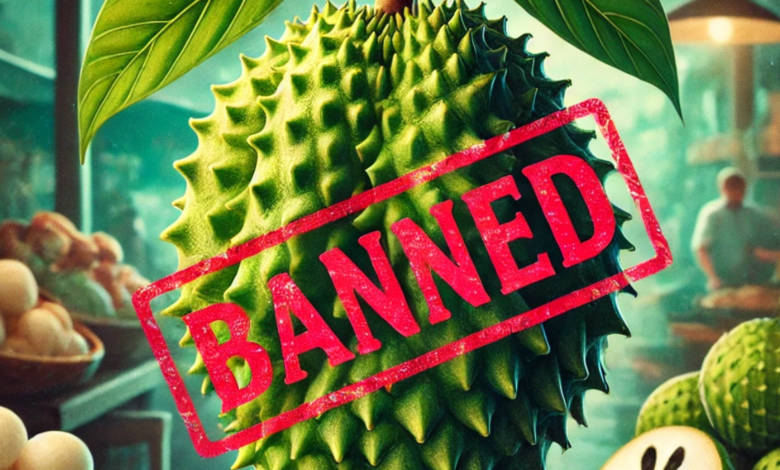Why Is Soursop Illegal? The Truth Behind the Banned Superfruit

Introduction: The Mystery Surrounding Soursop’s Legality
Soursop, also known as Graviola or Annona muricata, is a tropical fruit loved for its unique taste and impressive health benefits. It is often associated with natural remedies for various ailments, including its potential anti-cancer properties. However, despite its popularity, you may have heard whispers about its legal status—some claim it’s banned in certain places, while others say it’s restricted due to safety concerns.
So, why is illegal in some parts of the world? Is it really dangerous, or is there more to the story? Let’s dive into the details and uncover the real reason behind the controversy surrounding .
What Is Soursop? Understanding the Fruit’s Background
Soursop is a tropical fruit that grows mainly in the Caribbean, Central and South America, and some parts of Africa and Asia. It has a spiky green exterior and soft, juicy, white flesh inside. The taste is often described as a mix between pineapple, strawberry, and banana, with a slightly tangy undertone.
For centuries, has been used in traditional medicine to treat various ailments, such as infections, inflammation, digestive issues, and even cancer. Because of its potential health benefits, it has gained a reputation as a “miracle fruit” in natural medicine circles.
The Legal Status of : Where Is It Banned?
Soursop itself is not outright illegal in most places, but there are restrictions on certain parts of the plant, particularly its seeds and leaves. Countries like the United States, Canada, and some parts of Europe have regulations on supplements and extracts due to safety concerns.
1. The United States
In the U.S., you can find fresh fruit in some specialty grocery stores, but supplements made from soursop leaves and seeds are often banned or restricted. The FDA (Food and Drug Administration) has not approved soursop for medicinal use, and there have been warnings about its potential neurotoxic effects.
2. Canada
Canada has taken a stricter approach, prohibiting the sale of soursop supplements and extracts. While the fresh fruit itself is not illegal, any claims about its health benefits are heavily regulated to prevent misleading marketing.
3. Europe
European health authorities have also expressed concerns over toxicity. Certain soursop-based supplements have been restricted or banned, mainly due to their potential neurological effects.
4. Australia and Other Regions
Australia has similar regulations, particularly regarding supplements. Other countries, especially those with strong regulations on herbal medicine, have also placed restrictions on products derived from the plant.
The Science Behind the Ban: Is Soursop Dangerous?
The biggest reason soursop is restricted in many places is due to scientific concerns about its effects on the nervous system. Several studies have suggested that long-term consumption of soursop—especially its seeds, bark, and leaves—could lead to serious health problems.
1. Neurotoxicity and Parkinson’s Disease
Research has found that contains compounds called annonaceous acetogenins, which may have neurotoxic effects. Some studies suggest a link between regular consumption of and an increased risk of developing Parkinson’s-like symptoms.
One study conducted in the French Caribbean found that people who consumed regularly had a higher incidence of atypical Parkinson’s disease compared to those who didn’t.
2. Potential Toxicity to Humans
Apart from neurological concerns, excessive consumption of leaves and seeds may be toxic to the liver and kidneys. The natural chemicals in the plant can be cytotoxic, meaning they can kill cells, including healthy ones.
3. Lack of FDA Approval
Since soursop has not gone through rigorous clinical trials to prove its safety for medicinal use, the FDA has not approved it as a treatment for any disease. This lack of approval contributes to restrictions on its sale in supplement form.
Soursop and Cancer: A Controversial Debate
One of the biggest reasons soursop has gained attention is its potential anti-cancer properties. Some studies suggest that certain compounds in may help kill cancer cells, particularly in lab settings. However, this claim is highly controversial.
1. What the Research Says
Some laboratory studies have shown that soursop extracts can kill cancer cells in test tubes and animal studies. However, there is no strong clinical evidence that it works the same way in humans.
2. Misinformation and False Claims
Due to the lack of human trials, many health organizations, including the American Cancer Society, warn against using as an alternative cancer treatment. Some companies have been fined for making false claims that soursop is a “natural cure for cancer.”
3. Risks of Using as Medicine
Relying on soursop as a treatment instead of proven cancer therapies can be dangerous. It can lead to delayed medical care, worsening conditions, and potential toxicity.
Conclusion: The Truth About Soursop’s Legality
is not entirely illegal, but its leaves, seeds, and extracts are restricted in many countries due to concerns over neurotoxicity and potential health risks. While it has promising health benefits, including possible anti-cancer properties, there is not enough scientific evidence to support many of the claims made about it.
If you enjoy soursop, the key is moderation and caution. Always follow local regulations and consult a healthcare professional if you plan to use it for medicinal purposes. So, while soursop might not be outright banned, its risks and regulations make it a fruit worth understanding before adding it to your diet.





